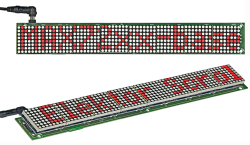Scrolling Message Display with Wi-Fi: 512 LEDs & ESP-12
August 29, 2018
on
on

512 LED & ESP-12F
Published in Elektor Magazine no. 3/2018 (May & June)
From the project page on the Elektor Labs website, you will learn how a first wired network version of this project was enhanced by adding the ESP8266-based wireless module.
LED matrix
There are many LED matrix models distinguished mainly by their poorly documented device orientation. Unfortunately, this can only be determined after the components have been purchased and put into service, with Mr Murphy watching. To avoid the embarrassment, Elektor Labs in their online store propose a set of eight of these components (marked FC-16).The LED matrices are mounted side by side, connecting the data output from one side to the data input from the other. The printed circuit board is designed accordingly, with simple routing and short lines.
Material
- ESP-12 Wi-Fi module
- 8 x 8 LED matrix
- 3.3-V (5 V / 2 A) power supply
Software
The well documented MD_MAX72xx library recognises various types of LED array controlled by the MAX7219; it will optionally allow you to change the orientation of the displayed text.Many variants are available. The sketch is profusely commented in English.
Read full article
Hide full article


Discussion (2 comments)